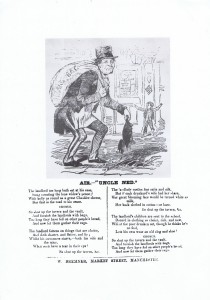The temperance movement had strong roots around Manchester, and when set alongside the numerous pubs and breweries that grew up around the factories and houses, the competing messages can be seen when the ballads are read carefully. In contrast to some of the bawdy drinking songs that were a common and popular topic for penny broadsides (Palmer 1980), Rag Bag is a cutting commentary on the exploitation of drinkers by greedy, lying landlords :
“The landlord fattens on things that are choice,
And doth chatter, and flatter, and lie;
While his customers starve – both his wife and the mice,
When seen have a tear in the eye.” (Rag Bag 1861)
Billy Brown is a cautionary tale of a girl who is abandoned by a man when he finds out she is pregnant. Having agreed to marry her the next day, he joins the Navy, never to return:
“He consented to marry her,
It should be seen the next day,
But instead of marrying this poor girl,
He too shipping, and he sail’d far away” (Billy Brown 1837)
The Spinners Lamentation is a story about unemployment and the decline of work that led to poverty and distress during the cotton famine:
“Come listen dear neighbours to these lines I have made,
Its concerning these times, and distress of our trade,
In both town and country our trade is so bad,
You may search where you will, there’s no work to be had”
(Spinner Lamentation 1846?)
The Spinners Lamentation has a printers stock number printed at the bottom that dates it to before 1846, and Boardman notes that “before the days of unemployment benefit, one of the ways unemployed people eked out a living was by going round singing and selling ballads” (Boardman and Palmer 1984: 18) so it may well be that an entrepreneurial Mancunian sold copies of this very song at a penny a piece, having first sung it in the pubs, streets and markets around Manchester.
This collection clearly shows that whilst a ballad may describe a prison (New Bailey Treadmill 1824), an execution (Allen, Gould and Larkin 1867), a new technology (Mr Sadlers Balloon 1785) or a soldier leaving to go to war (The Soldiers Farewell to Manchester c1800), the underlying message of a defiant, happy and resolute Mancunian spirit is never far away.
